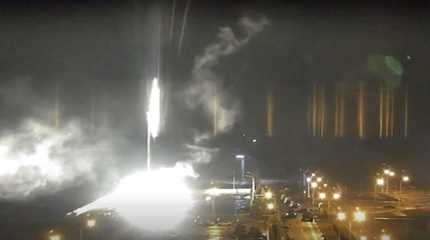
KYIV, Oct 13 (Reuters) - The head of Ukraine's state nuclear energy firm decried as "fake news" on Thursday Moscow's assertions that the Russian-occupied Zaporizhzhia nuclear power plant would require Russian fuel.
Energoatom chief Petro Kotin told Reuters in an interview there were two years' worth of fuel supplies stored at the six-reactor plant, which is still operated by Ukrainian staff.
Kotin also said the staff were facing threats of forced conscription into the Russian military.
"It is just an unprecedented situation for the... biggest nuclear power plant in Europe," Kotin said in his office, where a large photograph of the plant hangs behind his desk.
He was speaking after an official of Rosenergoatom, Russia's nuclear power operator, was quoted by Russia's TASS state news agency as saying that the plant would be switched to Russian fuel once its reserves are exhausted.
"There are... fake statements from Russians," Kotin said. "All of them are fakes. And actually it's not easy to just transfer the fuel loading in Zaporizhzhia from one supplier to another."
"Just to prepare for this transfer from one supplier to another you need about three years. So they (Russia) call tell this fake news," said Kotin.
Ukraine signed an agreement in June to obtain fuel for its nuclear plants from U.S. company Westinghouse - whose fuel powers four Zaporizhzhia units – and end its reliance on Russian supplies.
All six Zaporizhzhia reactors are now in cold shutdown, thereby extending the lifetime of their fuel and further obviating the need for Russian supplies, Kotin said.
Ukraine and Russia have accused each other of shelling the facility, raising fears of a disaster that could release radioactive clouds across the region or result in a reactor meltdown.
Kotin denied Ukraine had shelled the facility.
At least one Ukrainian staff member has been injured and the facility has suffered damage, including the severing of transmission lines powering reactor cooling systems, the U.N. nuclear watchdog, the International Atomic Energy Agency, has said. IAEA monitors have been at the facility since September.
RUSSIAN OCCUPIERS
The plant is in southern Zaporizhzhia province, one of four partially occupied regions that President Vladimir Putin claimed as part of Russia this month in a move condemned by the West.
Putin has also decreed Zaporizhzhia his government's property, a move Kotin dismissed as aimed at covering up "the successes of Ukrainian armed forces" in driving Russian troops from huge swaths of territory since September.
Putin, he said, should remove his troops from the plant and agree to an IAEA proposal to establish a demilitarized zone around the facility. Ukraine's President Volodymyr Zelenskiy renewed his call on Thursday for demilitarisation of the plant.
Kotin said his biggest fear was a cutoff of the external power needed for cooling the reactors and a loss of emergency diesel generators that have only 10 days of supplies of fuel, threatening a disastrous meltdown.
"That is the biggest threat at the moment because they damaged all the lines which connect Zaporizhzhia nuclear power plant to Ukraine's (electricity) system," he said.
Kotin said he did not know the whereabouts or condition of the plant’s deputy director, Valeriy Martynyuk, who was detained by Russian troops this week.
"We don’t have any information up until now," said Kotin. The IAEA helped secure Russia's release of the plant’s former director earlier this month.
The plant currently has some 7,000 Ukrainian personnel, down from the customary 9,500, and they are under heavy psychological pressure, Kotin said.
In the past week, the Russians have threatened to forcibly conscript staff into Russia's army unless they sign contracts to work for Rosatom, the Russian state nuclear power firm, he said. Reuters could not independently confirm this assertion.
"Nobody from the staff should sign anything," Kotin said.




